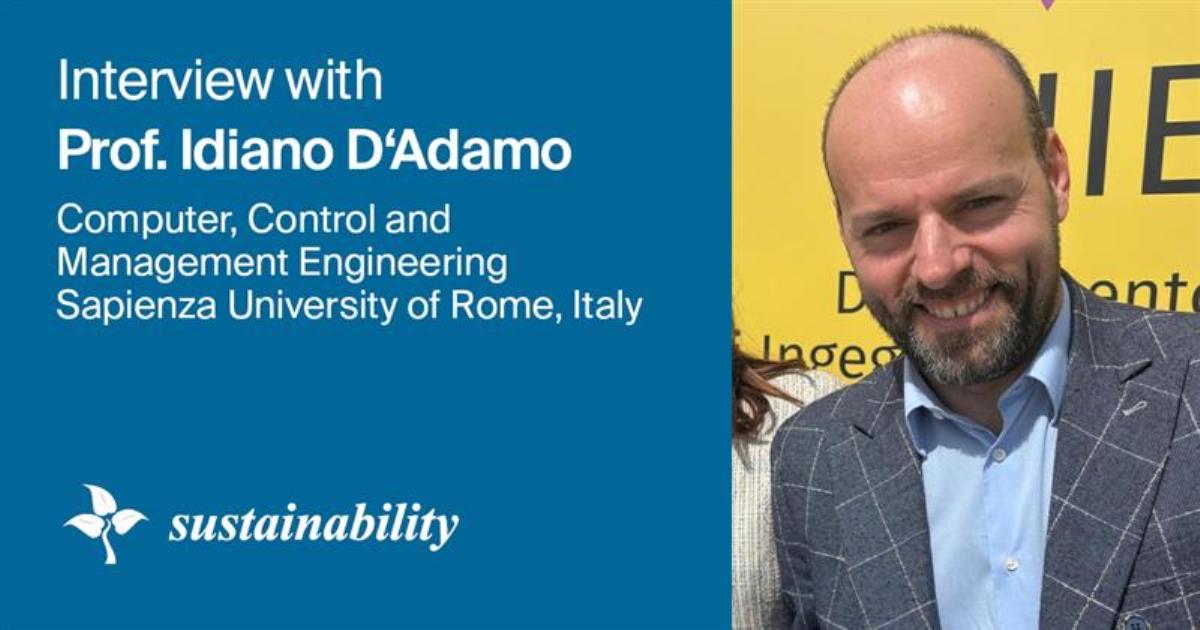
Sustainability | Interview with Prof. Idiano D’Adamo—Section Editor-in-Chief of the “Development Goals towards Sustainability” Section
Name: Prof. Idiano D’Adamo
Affiliation: Department of Computer, Control and Management Engineering Sapienza University of Rome, Via Ariosto 25, 00185 Rome, Italy
Research interests: bioeconomy; biomethane; circular economy; e-waste; economic analysis; photovoltaic; renewable energy; sustainability; waste management
The following is a short interview with Prof. Idiano D’Adamo:
1. What developments in your field of expertise excite you currently?The Sustainable Development Goals (SDGs) play a fundamental role in guiding global development towards a more inclusive, equitable, and environmentally sustainable future. Adopted by all United Nations Member States in 2015, the 17 SDGs offer a common framework for tackling the world's main challenges, ranging from poverty and hunger to climate change and inequality.
Sustainability is not just an interest, but a conscious and passionate choice. The answer to this vision is that a purely ideological approach, separated from concrete reality, does not allow us to improve our current situation, hence the need to adopt a pragmatic approach. In this way, what is born from thought must be put to the test of experience, trying to identify not only an abstract model but also a concrete solution. Theories and words are not enough; real actions and facts are necessary.
Pragmatic sustainability is a model that considers the three fundamental dimensions—environmental, economic, and social—and does not limit itself to theorizing a concept, but ensures that it is effectively applied in practice, concretizing itself through analyses that support its validity. Pragmatic sustainability is based on the concept of altruism, just like the morning sentinels celebrated by San Giovanni Paolo II, who defended “life at every moment of its earthly development” to make it “increasingly habitable for all”.
The idea is to maintain the rigor of this Section where the reject rate is high because when critical issues are highlighted, the utmost attention must be paid. The success of these 2 years derives from the synergy between all the members of the editorial team as it is necessary to work in a climate of harmony. This Section has the characteristic that a clear reference to the SDGs must be made within the manuscript. This objective is like the lighthouse that guides a ship in a storm. Publication times depend on many aspects, but it is always advisable to have at least two complete reviews. Long publication times risk losing the novelty of the work. Similarly, editors cannot keep scientific papers parked in their emails. Science must be respected, regardless of one's role. This Section will be able to continue without me because we must leave behind a method that the younger generation will be able to continue and probably do even better than us. The future goal of this Section is to preserve its quality.
3. As the Section Editor-in-Chief, what do you find to be the most important parameter for the success of the Section?Scopus recently proposed indications on authors in relation to the SDGs. This aspect must become a greater part of everyday life. This Section bases its strategy on always emphasizing the idea that scientific works that talk about sustainability should identify specifically which SDG they can achieve.
Sustainability is not a simple challenge; it requires big changes. The strength of this Section is the heart of those who work there and try to convey their passion for the topic of sustainability. We are a big family thanks to the excellent EBMs, managing editors, and assistant editors who work together in synergy. The concept of a sustainable community brings together the various stakeholders.
It is a great opportunity but also a potential risk. Its main advantage is that it allows everyone to read scientific works, especially young people, giving them the pleasant feeling of reading a work and who knows, maybe one day becoming a scientific author. Its main disadvantage is that there is a risk of giving too much importance to the economic aspects and it could prevent developing countries, as well as young researchers, from having the funds to be able to publish. The challenge of finding a balance must be sought in light of the dynamism that characterizes the scientific publishing market.
5. What advice would you offer to young researchers?An article should be written because you are passionate about it, not because you need to advance your career. An article requires your name because you worked on this research, sometimes you even give up your free time because you hope that your results can be of help to others. Do not listen to those who want to teach you how to write articles, but then you never see them working on articles! Try to learn, try to find time with colleagues you respect, and, where you can, create a healthy network in order to acquire new skills. When you feel your passion waning, stop and experience nature. Sea or mountain, the important thing is to breathe clean air, help people in need, and respect the great gift of life.
